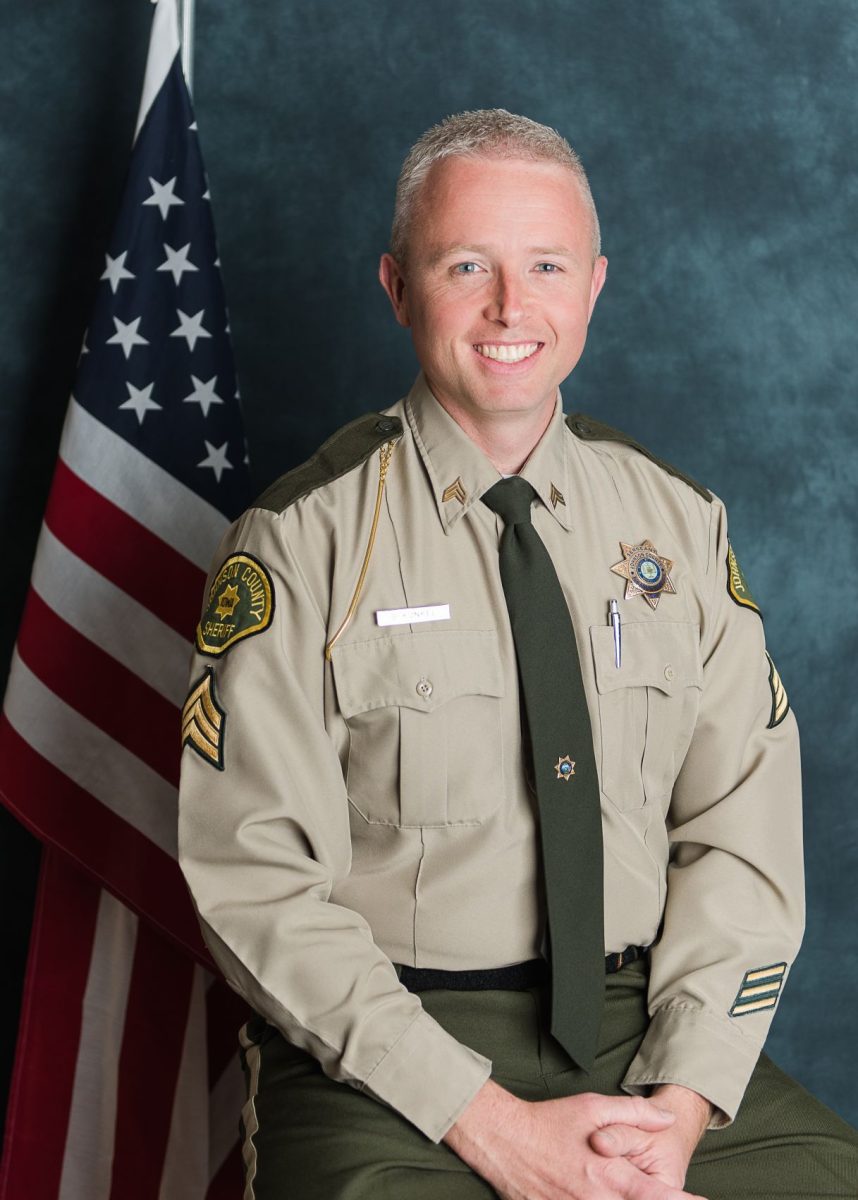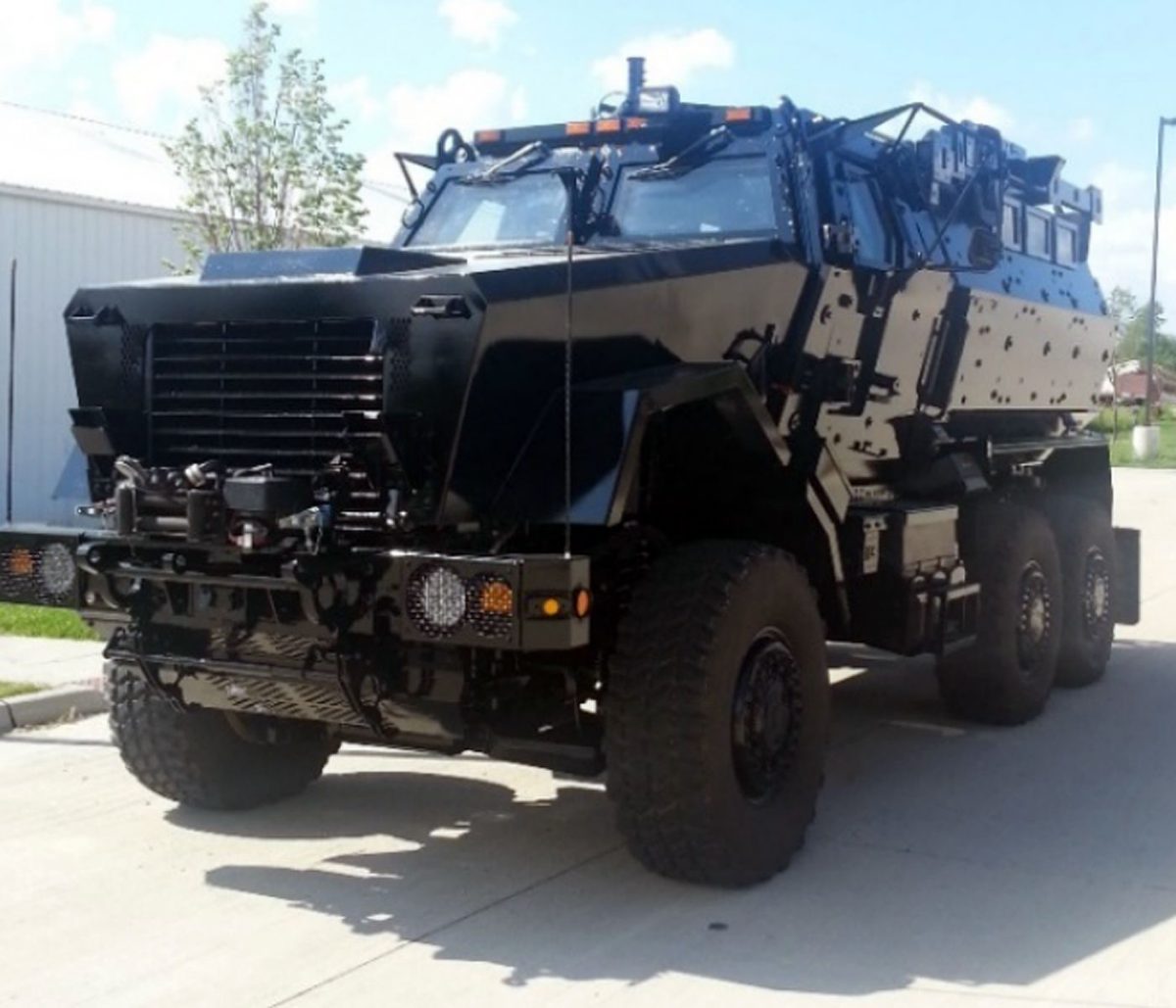IOWA CITY — The Johnson County Board of Supervisors came one step closer to finalizing the Fiscal Year (FY) 2023 budget with their first of three scheduled discussion and decision making votes held Wed. Jan. 12. Among the budget requests discussed was that of Sheriff Brad Kunkel who was seeking $810,841 for an additional patrol deputy, replacement of in-car and body worn cameras, and to purchase an armored truck to replace the controversial Mine Resistant Ambush Protected (MRAP) surplus military vehicle currently in use.
Public comments centered on Sheriff Kunkel’s requests, and primarily on the MRAP and the proposed $240k replacement known as a Lenco G2 Bearcat, a smaller armored body on a commercial truck chassis. Kunkel had proposed replacing the MRAP as community activists have railed against the vehicle, which was acquired by former Sheriff Lonny Pulkrabek in 2014 through a federal program that provides de-militarized equipment to law enforcement agencies at no cost other than transportation.
Among the opponents who spoke were Martha Hampel and Natalie Harwood. Hampel, an Iowa City activist and one of the originators of a petition opposing the vehicles, told the supervisors they were up to 632 signatures calling for the board to “dump” the MRAP, and not fund a Bearcat. Harwood called the MRAP “an agent of terror,” and “a vehicle of fear,” and stated the Johnson County Sheriff’s Office (JCSO) “wants to further terrorize the community.”
Kunkel, responding via email to follow up questions, said “Much of the dissent surrounding the MRAP has been fraught with mischaracterizations and misinformation. The reality is that it is an armored vehicle meant to keep law enforcement and the public safe from the threat of gunfire. The data surrounding its acquisition and deployments is publicly available and we have policy in place that dictates its usage.
The fact of the matter,” Kunkel said, “is that law enforcement is tasked with handling dangerous situations with the potential for violence, and sometimes we don’t have a choice but to send people into harm’s way and handle a situation. And one of the most important jobs of any agency leader is making sure you have the tools and training in place to keep the officers and the public safe, and that you are doing everything you can to make sure people go home at night.”
The supervisors voted unanimously to oppose the $240k for the Bearcat, which means the MRAP will continue in service. It has been deployed 19 times since 2014.
The supervisors also slashed Kunkel’s $404,782 request to fully replace body worn cameras (BWC) and in-vehicle cameras. The current system was first implemented in 2007 with in-car cameras and expanded in 2012 with the first body cameras being provided to deputies. The body cameras have been replaced once already, Kunkel said, and the current system, both in-car and body worn, is at the end of it’s service life.
“The need to replace the system was already increasing and during the summer of 2021 we were informed that the camera company was no longer supporting or servicing our cameras and ended the product line,” he said. 20 BWCs have been on order since May 2020, and still have not arrived, he added. “We are down 11 BWCs at the moment which means deputies have to share cameras.” Currently three patrol cars do not have functioning in-car cameras, and several units have non-functioning microphones. “The need for a new camera system is critical, and when the company ended the product line, well, that couldn’t have come at a worse time” he said. Sheriff Pulkrabek addressed the pending issue during his fall 2019 budget presentation, informing the Board a request for new cameras was likely on the horizon, Kunkel noted.
Supervisor Lisa Green-Douglass, who questioned the Sheriff in a December budget hearing about the cameras, stated she was willing to replace half of the units now, and would “consider the other half next year.” Staggering the purchases, she said, would prevent a recurrence of having to replace everything at once. Supervisor Rod Sullivan was in favor of full replacement.
All five voted yes to funding half, at a cost of $202,391. However only Sullivan and Supervisor Jon Green voted to fund the other half, also at $202,391, with Supervisors Pat Heiden, Royceann Porter, and Green-Douglass opposed.
Sheriff Kunkel, in his email response, said splitting the funding and purchasing meant the Sheriff’s Office would be faced with operating two different camera systems. The supervisors did approve 5-0 a $10k request for a data storage system for the cameras.
$10k for public outreach was also approved, but on a 3-2 vote with Green and Green-Douglass opposed.
Community outreach, Kunkel explained, can take various forms from buying donuts and taking them to students at local schools (as was done at Clear Creek Amana High School last month), to increasing the department’s efforts on National Night Out, or participating in community events to connect with the immigrant communities. “It is very important that we work hard to maintain and build trust with all of the communities we serve,” Kunkel said. “Community policing is more important now than ever, and we owe it to the public to meet them where they’re at.” He added community outreach efforts can also promote crime prevention, build connections with victims/survivors, and even expand the pool of future law enforcement applicants.
During public comments, one speaker (who also opposed the MRAP and Bearcat, and also spoke out against the BWCs) decried the expenditure for public outreach, calling it “propaganda.”
A new FTE (Fulltime Equivalent) patrol deputy, at a cost of $104,059 was approved on a 4-1 vote with Supervisor Green in opposition. “The need for the additional deputy is simply to keep up with the growth of the county,” Kunkel said, “including the additional hours contracted by the city of Tiffin for the upcoming year.”
In July, the city will increase their weekly contracted patrol hours to 94, up from the current 75. “By adding another deputy to the Patrol Division, we can spread the coverage out across the division while making sure rural Johnson County, and the other contract towns are patrolled adequately as well,” said Kunkel. “As the County grows, so do the demands for public safety, and we need to grow our office accordingly.”
However, a new patrol vehicle for the deputy was cut on a 4-1 vote with Green, Green-Douglass, Heiden, and Porter voting no, and Sullivan in favor. “They can use an off-duty officer’s car,” Green-Douglass said adding “Not every deputy needs their own car.”
Kunkel, via email, explained the rationale behind the $42k patrol vehicle noting the JCSO has assigned take-home vehicles to each patrol deputy for about 15 years. Before the policy change a small number of deputies shared cars. However, Sheriff Pulkrabek “wisely decided to move away from that practice,” Kunkel said. “Take-home cars assigned to each deputy improves response times, increases the lifespan of the car, and allows deputies to start and end their shifts from their residence. If we reverted back to car sharing, we would see higher mileage in a shorter amount of time, increased maintenance, and we would be cycling vehicles out for replacement at a much higher rate.”
Kunkel explained many deputies live in rural Johnson County and in the contract towns. Having a take-home car, he said, enables them to be better positioned for calls, particularly around shift change, rather than having to respond out from the office in Iowa City. “This also helps reduce the amount of money we pay in overtime to deputies held over at the end of their shift,” he said and added having a fully marked patrol car parked in a neighborhood is yet another method of community policing, “and is very well received in the neighborhoods we live and work in.”
After nixing the Bearcat, half of the cameras, and the new patrol vehicle, the supervisors had trimmed the budget request to $368,450. It should be noted the supervisors also cut a request for four new paramedics for the Johnson County Ambulance Service in half while cutting out other new staffing requests as well.
The Board was scheduled to hold their second discussion and decision making vote on Tuesday, Jan. 18 with a third vote set for Wednesday, Jan. 19 (if needed). An additional discussion and decision vote is tentatively scheduled for Wednesday, Feb. 2 (again, if needed). The FY 23 budget should be approved in March with the new fiscal year starting on July 1 and ending June 30, 2023.
The Johnson County Sheriff’s Office acquired this military surplus Mine Resistant Ambush Protected (MRAP) vehicle in 2014 through the federal 1033 program.


